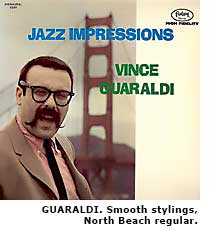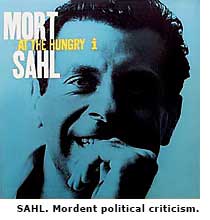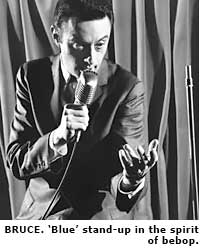Bohemia by the Bay: Looking Back on the Beat Generation - Page 5
The objects of Ginsberg's empathy and criticism resonated with the Beat Generation, several of whose prominent figures appear within 'Howl,' often in coded references. Peppered with homoerotic and other sexual allusions, 'Howl' gained further fame as the subject of an obscenity trial, at which Ferlinghetti prevailed.

8. VINCE GUARALDI
"Jazz didn't need any poetry," maintains jazz pianist Larry Vuckovich. "It was poetry in itself." But in the 1950s, jazz was happening in the same environs as poetry, in North Beach, where one of the neighborhood's most distinctive-looking musicians, the mustachioed Vince Guaraldi, became the young Vuckovich's piano teacher.
"San Francisco in the '50s covered the whole [musical] spectrum," Vuckovich remembers, and Guaraldi's keyboard and compositional style embodied several genres: cool phrasing, Latin syncopation, and a light-hearted approach to voicings evocative of country player Floyd Cramer.
Hard-bop players were closer in rhythm and spirit to the written language of the Beats, but the denizens of North Beach frequented clubs where Guaraldi worked his smoother stylings. They also caught him in the company of Latin leader Cal Tjader, who launched Guaraldi's recording career and employed him throughout the '50s, until the pianist left to focus on a solo career. Guaraldi also appeared elsewhere in San Francisco, sometimes engaging Vuckovich as a 'sub' or as a partner in dual-piano gigs.
The breezy classic, 'Cast Your Fate to the Wind,' from Guaraldi's 1962 album Impressions of 'Black Orpheus,' brought him a jazz Grammy and crossover placement on the pop charts.
A couple of years later, Guaraldi secured another long-term gig, scoring a series of television productions and a full-length film based on California cartoonist Charles Schulz's 'Peanuts' comic strip. The pianist's sweet 'Linus and Lucy' theme for 'Peanuts' brought him the greatest renown and fame, long outlasting his premature death at age 47 in 1976.

9. MORT SAHL
Credited as one of the forefathers of contemporary stand-up comedy, Mort Sahl could be more accurately tagged as a comic social commentator, an important subset of the stand-up panoply.
Born in Montreal and brought up in Southern California, Sahl came north in the early 1950s to Enrico Banducci's hungry i nightclub in North Beach to hone his chops. Newspaper in hand and casually dressed in a pullover sweater, he'd comment sardonically on current events, especially politics.
"Sahl was just so charming," recalls Catherine Munson, then a young married biochemical researcher and soon to become the first lady of sales for Eichler Homes. "We were heavily involved in the politics and excitement of change, so we thoroughly enjoyed Mort."
Despite his rather academic appearance, Sahl's mordent political criticism resonated with the anti-authoritarian attitude of the Beats. And though he lacked the self-deprecating insight of Woody Allen and the risqué blue humor of Lenny Bruce, Sahl was much revered by contemporary and later comedians; in fact, Allen compared Sahl's influence on comedy to Charlie 'Bird' Parker's on jazz. Sahl was also befriended by several American Presidents, recorded a dozen albums (including one at the hungry i), and appeared in several films.

10. LENNY BRUCE
The hungry i, along with other North Beach venues, also helped spotlight the stand-up comedy career of Lenny Bruce, whose approach shared Sahl's criticism of the establishment but differed distinctly in Bruce's use of character voices and confrontational profanity.
Bruce's spontaneous, inspired, sometimes eccentric riffing was in fact much closer to the spirit of bebop than was the smooth, reserved demeanor of Sahl. "I preferred Bruce to either Allen or Sahl, because Bruce was more biting," says Ned Eichler. "But my parents just didn't take to him. They liked Woody [Allen] and the folksingers."
The law's surveillance of Bruce's material for obscenity was more pernicious than that suffered by the Beat poets, who were of course drawn to Bruce's club appearances on both coasts. Bruce was in fact arrested several times, and ultimately died of a morphine overdose while awaiting appeal on a workhouse sentence.
Among Bruce's San Francisco fans was newspaper columnist Herb Caen, who dubbed him "a rebel, but not without a cause." Bruce recorded some of his overdrive schtick for Fantasy, the Berkeley-based record label, and remains a role model for practitioners of 'blue' stand-up comedy.




